高中英语Module4MusicSectionⅤWriting有关音乐活动的邀请信教案外研版选修6
高中英语Module4Music单元小结教案含解析外研版选修60829435
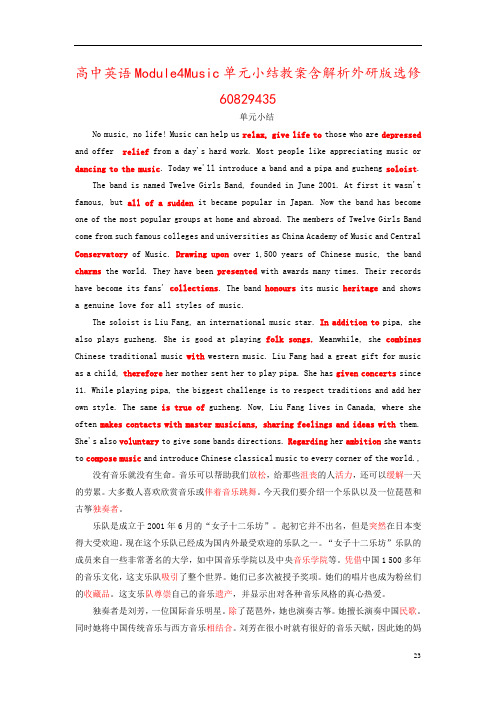
高中英语Module4Music单元小结教案含解析外研版选修60829435单元小结No music, no life! Music can help us relax, give life to those who are depressed and offer relief from a day's hard work. Most people like appreciating music or dancing to the music. Today we'll introduce a band and a pipa and guzheng soloist.The band is named Twelve Girls Band, founded in June 2001. At first it wasn't famous, but all of a sudden it became popular in Japan. Now the band has become one of the most popular groups at home and abroad. The members of Twelve Girls Band come from such famous colleges and universities as China Academy of Music and Central Conservatory of Music. Drawing upon over 1,500 years of Chinese music, the band charms the world. They have been presented with awards many times. Their records have become its fans' collections. The band honours its music heritage and shows a genuine love for all styles of music.The soloist is Liu Fang, an international music star. In addition to pipa, she also plays guzheng. She is good at playing folk songs. Meanwhile, she combines Chinese traditional music with western music. Liu Fang had a great gift for music as a child, therefore her mother sent her to play pipa. She has given concerts since 11. While playing pipa, the biggest challenge is to respect traditions and add her own style. The same is true of guzheng. Now, Liu Fang lives in Canada, where she often makes contacts with master musicians, sharing feelings and ideas with them. She's also voluntary to give some bands directions.Regarding her ambition she wants to compose music and introduce Chinese classical music to every corner of the world., 没有音乐就没有生命。
高中英语:Module 4《Music》教案3(13页)
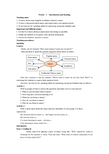
Period 1 Introduction and ReadingTeaching aims:1. To know about some English vocabulary related to music.2. To have a discussion about music and express their own opinions freely.3. To develop the Ss’ spe aking ability by practicing saying the familiar topic.Important and difficult points:1. Get the Ss to know about as much music knowledge as possible.2. Enable the students to recognize some musical instruments.3. Arouse the students’ interests in music.Teaching procedures:SpeakingLead-inFirstl y, ask the students “How many kinds of music do you know?”Then ask them to speak the general categories about music as follow:After this, continue to ask the students “Which kind of music do you like best? Why?” to encourage the students to express their opinions freely.And then, develop the Ss’ spe aking ability by practicing saying the familiar topic as follows: Activity 1Work in groups of four to answer the questions and make a list of your answers:1. What is your favourite kind of music?2. How long have you been listening to it?3. When do you listen to music?4. How do you listen to music?5. Why do you listen to music?Activity 2Write a short report about the music interests and habits of your group. Use these expressions:My favourite kind of music is …but Yang’s favorite music is…My favorite artist is…I’ve been listening to music…for/since…I like listening to music when I’m…IntroductionStep 1. Leading-inFirstly, lead in by playing a piece of music Liang zhu(梁祝)played by violin or Guzheng for the students to listen. Then ask them “What kind of musical instrument is the piece of music played by?”Next, brainstorm musical instruments: “How many kinds of musical instruments do you know?” At the same time, in ord er to make the students know about some English vocabulary related to music, show the students some pictures and ask them to recognize the musical instruments as follows:After this, say to the students, “Most of you are familiar with these musical instruments. Today we’ll know more Chinese and western musical instruments. Now let’s know more musical instruments.”flute guitar saxophoneStep 2.Activity 1Continue telling the Ss that the following photos are almost the same with those of their book on page 31. And ask them to look at the photos of Chinese and western musical instruments and answer the following questions.1. Which instruments have strings?2. Which Chinese and western instruments look similar.3. Which of the instruments does the musician hold when he / she is playing?Step 3.Activity 2Ask the students to look at the pictures and read the information about Chinese and Western musical instruments.Step 4. DiscussionGet the students to discuss the following questions with other students.1. How many of the above Chinese instruments have you heard?2. Do you know any artists who play them?Reading and VocabularyTeaching aims and demands:⒈ To learn about some vocabulary and knowledge related to music.⒉ To catch the general idea of the whole passage.⒊ To understand the affection of the author.⒋ To be good at grasping the key words and recognizing the new words according to the context. is a lute with four strings and is a relative of the European . It came to China from Central Asia in the fourth century.⒌ To develop their love and interests in music by knowing more about some musicians.Teaching key points:To make the students grasp the usage of some vocabulary and phrases.Teaching difficulty:To develop their reading abilities and the awareness of the appreciation.Teaching aid:Multi-mediaTeaching procedures:Step 1. Fast readingActivity 1Ask the students to find out the answers to the following questions, while listening andreading the text: 1. How many the musical instruments she plays? 2. What has an influence on her in her music career? 3.What’s her ambition regarding Chinese music? Answers: ①The pipa, the guzheng, the yueqin.②The main influence is traditional singing. ③she wish to introduce classical Chinese pipa and guzheng music to every corner of theworld.Step 2. Intensive readingActivity 1Ask the students to match the words with their meanings:2. a way of doing something, for example, playing an instrument ________3. another word for melody or in the air________4. an event where musicians play ________5. all the pieces of music that a musician can play ________6. a school where musicians study ________Answers: 1.soloist 2. technique 3. tune 4. concert 5. repertoire 6. conservatoryActivity 2Ask the students to complete the following sentences with the correct form of the words in 1. She likes to __________ musical styles from east and west.2. What is the _____of the piece she played?3. I like listening to ___________Chinese folk songs.4. It’s a great __________to play an instrument like the pipa.5. Sometimes there is a long ________in the middle of the piece.6.I like the way she ___________classical pieces.Answers:1. combine 2. title 3. traditional 4. challenge 5. silence 6. interpretsActivity 3Ask the Ss to read part 1 of the passage and explain the following references.1)...during her visit to China. Who visited China? 2)...each one has its special way of interpreting the classical pieces. Each what? 3)The same is true of my second instrument. What is true about the second instrument? 1. (The Queen of England) 2. (Pipa school) 3. (To respect traditional but add her own style when playing)Activity 4Ask the Ss to read part 2 of the passage and choose the correct answers.1. When people listen to her playing,________.(a) they also hear her singing(b) they think they can hear her singing2. Liu Fang thinks that _________.(a) Chinese music is like the Chinese language(b) Chinese music and language use the same tones3. Chinese classical pieces often have poetic titles,______.(a) which is understandable(b) which is very surprising4. Empty spaces in Chinese paintings_______.(a) are like the silent parts of Chinese music(b) mean the pictures have no lifeAnswers: 1. b 2. a 3. a 4. aActivity 5Ask the Ss to read part 3 of the passage and answer the following questions.1. What does Liu Fang enjoy about performance?2. What makes her feel depressed or lonely?3. What does she want to do with other musicians?Answers:1. The atmosphere in a concert hall. 2. When she has no concert for along time 3. Work with them.Activity 6Ask the Ss to complete the passage use the correct words in the text.Liu Fang, who was _____ in 1974, is an __________ music star. Since the age of six, she has played ____, and since the age of eleven she has given concerts including the performance for ___________________. She studied _______________ during her university. When she was five years old, her mother, who was ______________, taught her to play the ________. In 1996, she and her husband moved to ________.For her ,the biggest challenges of playing the pipa and guzheng are________________________________________. The main influence on Liu Fang is ________________. When she is playing, listeners say that they can _____________ in her music.Chinese music ___________ the Chinese language. Chinese classical pieces have poetic titles,which is ________________. ____________ in Chinese paintings are like the silent parts of Chinese music.Answers: 1. born 2. international 3. pipa 4. the Queen of England 5. guzheng and pipa 6. a Dianju actress7. yue qin 8. Canada 9. to respect the traditions but add her own style 10. traditional singing 11. hear singing 12. is similar to 13. understandable 14. Empty spacesStep 3.Homework:Work in pairs and have a discussion on the following questions.1. What about Liu Fang impressed you most?2. Do you think Liu Fang is successful as an artist? Give possible reasons if you think so.Period 2 GrammarTeaching objectives and demands:1. To experience and discover what is the Present Perfect Progressive Tense.2. To grasp the usage of the Present Perfect Progressive Tense.3. To know the main differences between the Present Perfect Tense and the Present Perfect Progressive Tense.Teaching keys and difficulties:1. To grasp the usage of the Present Perfect Progressive Tense.2. To know the main differences between the Present Perfect Tense and the Present Perfect Progressive Tense.Teaching procedures:Step 1. Experience and discover the Present Perfect Progressive Tense.Activity 1Directions: ask the students to read the sentences from the passage in Reading andV ocabulary and decide if they are true Example sentences:Liu Fang has played the pipa since the age of six.She’s given concerts since she was eleven.Now, please tick the following sentences you agree with according to the above example sentences.1. Liu Fang still plays the pipa.2. She only played the pipa when she was six.3. She has given concerts regularly since the age of eleven.4. She only gave concerts when she was a child.Activity 2Directions: ask the students to read the example sentences and answer the questions. Example sentences:Liu Fang has been playing the pipa for the last three hours.She’s been performing concerts every day since last month.Q1: What is the difference in form between these sentences and those in Activity 1.Answers: They are in the present perfect progressiveQ2: Which of these things is true about the sentences?(a)The people started doing these things in the past and are still doing them.(b)The people do these things every day.(c)The actions take a very long time to complete.Answers: (a)Step 2. Detailed explanation about the Present Perfect Progressive Tense.I. The form of the Present Perfect Progressive Tense.现在完成进行时由“助动词have/has+been+动词-ing”形式构成。
高中英语 Module 4 Music Section Ⅰ Reading(Introduction
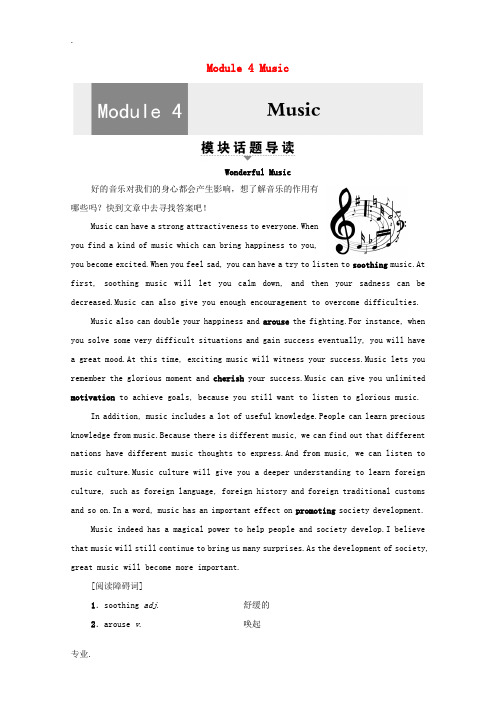
Module 4 MusicWonderful Music好的音乐对我们的身心都会产生影响,想了解音乐的作用有哪些吗?快到文章中去寻找答案吧!Music can have a strong attractiveness to everyone.Whenyou find a kind of music which can bring happiness to you,you become excited.When you feel sad, you can have a try to listen to soothing music.At first, soothing music will let you calm down, and then your sadness can be decreased.Music can also give you enough encouragement to overcome difficulties.Music also can double your happiness and arouse the fighting.For instance, when you solve some very difficult situations and gain success eventually, you will have a great mood.At this time, exciting music will witness your success.Music lets you remember the glorious moment and cherish your success.Music can give you unlimited motivation to achieve goals, because you still want to listen to glorious music.In addition, music includes a lot of useful knowledge.People can learn precious knowledge from music.Because there is different music, we can find out that different nations have different music thoughts to express.And from music, we can listen to music culture.Music culture will give you a deeper understanding to learn foreign culture, such as foreign language, foreign history and foreign traditional customs and so on.In a word, music has an important effect on promoting society development.Music indeed has a magical power to help people and society develop.I believe that music will still continue to bring us many surprises.As the development of society, great music will become more important.[阅读障碍词]1.soothing adj. 舒缓的2.arouse v. 唤起3.cherish v. 珍惜4.motivation n. 动力5.promote v. 促进[诱思导读]阅读短文,回答以下问题。
外研版选修六module4《music》优秀教案(重点资料).doc

外研版选修六module4《music》优秀教案(重点资料).docModule 4 MUSICPeriod 1 Introduction /Reading andVocabularyStep1 GreetingsStep II Lead-in and Fast readingT: Boys and girls, from this class we ’ll learn module 4 “Music ’’.Referring to music, I think everyone must want to say something,because we all like it. When we listen to it, we feel verypeaceful and relaxed. Many beautiful scenes appear in front ofus, such as long corridor, blue sky, white cloud and so on. OnceI am in blue mood or I am upset, I ’ll choose some lively piecesand they will quickly bring me back to normal state. We knowany beautiful music is closely connected to various musicalinstruments, can you list some names of the Chinese and westernmusical instruments? Can you point out which of them Chineseand Western musical instruments are?S; yes, violin, piano, guitar, Erhu, pipa, guzheng, saxophone, and so on.tar Musical instruments piano violin drum saxophoneerhu guzheng lute pipa harp mandolinyueqin konghouT;OK, please turn to page 43,let’s look at introduction. Do the task1.Answers to exercise 1:1. All of them. 2.papa and lute, konghou and harp. 3.pipa, lute, yueqin, and mandolin. Discussion. read the information about Chinese and western musical instruments in activity2, and discuss the following questions.Page43 (1) bianzhong, zhuihu, bone fluteWe know there is a famous artist in china, who is good at playing pipa and guzheng.Pre-readingSuppose you have an interview with her, what questions will you ask? And then write them down. Maybe you want to ask her whereshe comes from? When was she born ? ok, please turn to page 44.read the passage quickly and fill in the table with information about liufang before reading ,I give you some words to help you explain this passageRead it quickly, according to the passage ,then fill in the blanksRead the passage carefully and find the main idea of each part. PARA1: introduces Liu Fang as well as her musical trainingand backgroundPARA2: tells about Liu Fang’s musical influences andcharacteristics of Chinese classical musicPARA3: is about Liu Fang’s love for performing live and her goals as an artist.Then do the task 5.Suggested answers; soloist, technique, tune, concert, repertoire, conservatory.Post-reading finish the task 1.-4Suggested answers:1. The Queen of England 2.Her mother.3.Canada4.Pipa school5.To respecttraditions but add her own style whenplaying.2.1.-5: a,b,a,a,a,3.①The atmosphere in a concert hall.②She feels lonely and depressed when thereis no concert for a long time③ She wants to work with master musiciansfrom other traditions and play withthem ,using elements from differentcultures to compose her own music.④She wants to compose her own music, andintroduce classical Chinese pipa andguzheng music to every corner of theworld.4. combine,title,tune,concert,repertoire,silence,interprets5.Soloist technique,tune ,concert,repertoire, conservatory language points:1 graduate from 毕业他去年中学毕业。
高二英语Module4Music外研社知识精讲
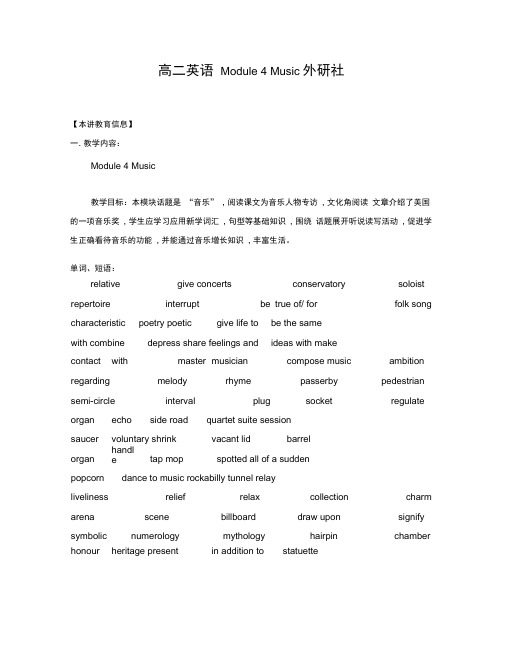
高二英语Module 4 Music 外研社【本讲教育信息】一. 教学内容:Module 4 Music教学目标:本模块话题是“音乐” , 阅读课文为音乐人物专访, 文化角阅读文章介绍了美国的一项音乐奖, 学生应学习应用新学词汇, 句型等基础知识, 围绕话题展开听说读写活动, 促进学生正确看待音乐的功能, 并能通过音乐增长知识, 丰富生活。
单词、短语:relative give concerts conservatory soloist repertoire interrupt be true of/ for folk song characteristic poetry poetic give life to be the samewith combine depress share feelings and ideas with makecontact with master musician compose music ambition regarding melody rhyme passerby pedestrian semi-circle interval plug socket regulate organ echo side road quartet suite sessionsaucer voluntary shrink vacant lid barrelorgan handle tap mop spotted all of a suddenpopcorn dance to music rockabilly tunnel relayliveliness relief relax collection charm arena scene billboard draw upon signifysymbolic numerology mythology hairpin chamber honour heritage present in addition to statuettegramophone critic therefore重点词语:relative give concerts interrupt be true of/ for folk song characteristic give life to be the same w ith combine depress share feelings and ideas with makecontact with master musician compose music ambition regarding passerby pedestrian regulate shrinkhandle all of a sudden dance to music relay liveliness relief relax draw upon presentin addition to therefore词语要点归纳:1. similar adj. 相似的;类似的。
高中英语Module4《Music》教案外研版
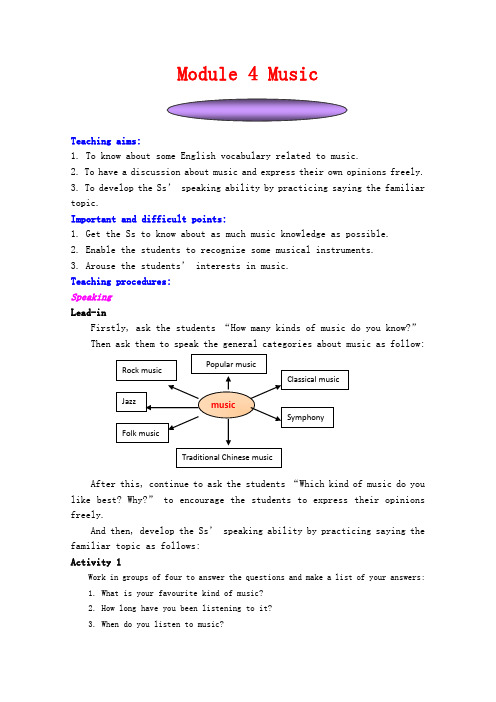
Module 4 MusicTeaching aims:1. To know about some English vocabulary related to music.2. To have a discussion about music and express their own opinions freely.3. To develop the Ss’ spe aking ability by practicing saying the familiar topic.Important and difficult points:1. Get the Ss to know about as much music knowledge as possible.2. Enable the students to recognize some musical instruments.3. Arouse the students’ interests in music.Teaching procedures:SpeakingLead-inFirstly, ask the studen ts “How many kinds of music do you know?”Then ask them to speak the general categories about music as follow:After this, continue to ask the students “Which kind of music do you like best? Why?” to encourage the students to express their opinions freely.And then, develop the Ss’ spe aking ability by practicing saying the familiar topic as follows:Activity 1Work in groups of four to answer the questions and make a list of your answers:1. What is your favourite kind of music?2. How long have you been listening to it?3. When do you listen to music?4. How do you listen to music?5. Why do you listen to music?Activity 2Write a short report about the music interests and habits of your group. Use these expressions:My favourite kind of music is …but Yang’s favorite music is…My favorite artist is…I’ve been listening to music…for/since…I like listening to music when I’m…IntroductionStep 1. Leading-inFirstly, lead in by playing a piece of music Liang zhu(梁祝)played by violin or Guzheng for the students to listen. Then ask them “What kind of musical instrument is the piece of music played by?”Next, brainstorm musical instruments: “How many kinds of musical instruments do you know?” At the same time, in order to make the students know about some English vocabulary related to music, show the students some pictures and ask them to recognize the musical instruments as follows:brain-storming:Are you familiar with these instruments?piano drumMusical instrumentsviolin erhuAfter this, say to the students, “Most of you are familiar with these musical instruments. Today we’ll know more Chinese and western musical instruments. Now let’s know more musical instruments.”flute guitar saxophoneStep 2.Activity 1Continue telling the Ss that the following photos are almost the same with those of their book on page 31. And ask them to look at the photos of Chinese and western musical instruments and answer the following questions.1. Which instruments have strings?2. Which Chinese and western instruments look similar.3. Which of the instruments does the musician hold when he / she is playing?Step 3.Activity 2Ask the students to look at the pictures and read the information about Chinese and Western musical instruments.The konghou is an instrument with strings. It came to China from theWest during the Han Dynasty about 2,000 years ago.The guzheng has been used for more than 2,300 years.It looks like a table harp.The pipa is a lute with four strings and is a relative of the Europeanlute. It came to China from Central Asia in the fourth century.The yueqin is a round instrument like a mandolin. It wascalled qinpipa during the Han Dansty.Step 4. DiscussionGet the students to discuss the following questions with other students.1. How many of the above Chinese instruments have you heard?2. Do you know any artists who play them?Teaching aims and demands:⒈ To learn about some vocabulary and knowledge rel ated to music.⒉ To catch the general idea of the whole passage.⒊ To understand the affection of the author.⒋ To be good at grasping the key words and recognizing the new wordsaccording to the context.⒌To develop their love and interests in music by knowing more about somemusicians.Teaching key points:To make the students grasp the usage of some vocabulary and phrases. Teaching difficulty:To develop their reading abilities and the awareness of the appreciation. Teaching aid:Multi-mediaTeaching procedures:Step 1. Fast readingActivity 1Ask the students to read through the text quickly and find out the information about Liu FangActivity 2Ask the students to find out the answers to the following questions, while listening and reading the text:1. How many the musical instruments she plays? 2. What has an influence on her in her music career? 3.What’s her ambition regarding Chinese music?Answers:①The pipa, the guzheng, the yueqin.②The main influence is traditional singing. ③she wish to introduce classical Chinese pipa and guzheng music to every corner of the world.Step 2. Intensive readingActivity 1Ask the students to match the words with their meanings:1. a musician who performs alone________2. a way of doing something, for example, playing an instrument________3. another word for melody or in the air________4. an event where musicians play________5. all the pieces of music that a musician can play________6. a school where musicians study ________Answers: 1.soloist 2. technique 3. tune 4. concert 5. repertoire 6. conservatoryActivity 2Ask the students to complete the following sentences with the correct form of the words in the box.1. She likes to __________musical styles from east and west.2. What is the _____of the piece she played?3. I like listening to___________Chinese folk songs.4. It’s a great __________to play an instrument like the pipa.5. Sometimes there is a long ________in the middle of the piece.6.I like the way she ___________classical pieces.Answers:1. combine 2. title 3. traditional 4. challenge 5. silence 6. interpretsActivity 3Ask the Ss to read part 1 of the passage and explain the following references.1)...during her visit to China. Who visited China?2)...each onehas its special way of interpreting the classical pieces. Each what?3)The same is true of my second instrument. What is true about the second instrument?1. (The Queen of England) 2. (Pipa school) 3. (To respect traditional but add her own style when playing)Activity 4Ask the Ss to read part 2 of the passage and choose the correct answers.1. When people listen to her playing,________.(a) they also hear her singing(b) they think they can hear her singing2. Liu Fang thinks that _________.(a) Chinese music is like the Chinese language(b) Chinese music and language use the same tones3. Chinese classical pieces often have poetic titles,______.(a) which is understandable(b) which is very surprising4. Empty spaces in Chinese paintings_______.(a) are like the silent parts of Chinese music(b) mean the pictures have no lifeAnswers: 1. b 2. a 3. a 4. aActivity 5Ask the Ss to read part 3 of the passage and answer the following questions.1. What does Liu Fang enjoy about performance?2. What makes her feel depressed or lonely?3. What does she want to do with other musicians?Answers:1.The atmosphere in a concert hall. 2.When she has no concert for along time3.Work with them.Activity 6Ask the Ss to complete the passage use the correct words in the text. Liu Fang, who was _____ in 1974, is an __________ music star. Since the age of six, she has played ____, and since the age of eleven she has given concerts including the performance for ___________________. She studied _______________ during her university. When she was five years old, her mother, who was ______________, taught her to play the ________. In 1996, she and her husband moved to ________.For her ,the biggest challenges of playing the pipa and guzhengare________________________________________. The main influence on LiuFang is ________________. When she is playing, listeners say that they can _____________ in her music.Chinese music ___________ the Chinese language. Chinese classical pieces have poetic titles, which is ________________. ____________ in Chinese paintings are like the silent parts of Chinese music.Answers: 1. born 2. international 3. pipa 4. the Queen of England 5. guzheng and pipa 6. a Dianju actress7. yue qin 8. Canada 9. to respect the traditions but add her own style 10. traditional singing 11. hear singing 12. is similar to 13. understandable 14. Empty spacesStep 3.Homework:Work in pairs and have a discussion on the following questions.1. What about Liu Fang impressed you most?2. Do you think Liu Fang is successful as an artist? Give possible reasons if you think so.Teaching objectives and demands:1. To learn new words and expressions and learn how to use them.2. To understand some a little long but complex sentences.Teaching keys and difficulties:The usage of: give concerts; graduate from; be true of/for; tune; experience(v./n.); share sth. with sb.; make contact with; wish. Teaching procedures:Step 1.Revision1. Check what they learn in the previous class.2. Get students to.Step 2.Important words, phrases, & sentences.1. She’s given concerts since she was eleven, including a performance for the Queen of England during her visit to China.(Part1. para.1)11岁起她就举办演奏会,包括英国女王访华期间为女王做的一场演出。
高中英语-Module-4《Music》说课稿-外研版选修6
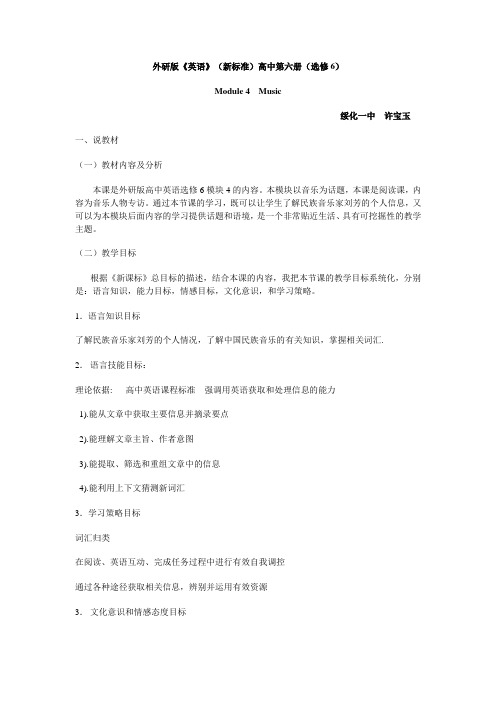
外研版《英语》(新标准)高中第六册(选修6)Module 4 Music绥化一中许宝玉一、说教材(一)教材内容及分析本课是外研版高中英语选修6模块4的内容。
本模块以音乐为话题,本课是阅读课,内容为音乐人物专访。
通过本节课的学习,既可以让学生了解民族音乐家刘芳的个人信息,又可以为本模块后面内容的学习提供话题和语境,是一个非常贴近生活、具有可挖掘性的教学主题。
(二)教学目标根据《新课标》总目标的描述,结合本课的内容,我把本节课的教学目标系统化,分别是:语言知识,能力目标,情感目标,文化意识,和学习策略。
1.语言知识目标了解民族音乐家刘芳的个人情况,了解中国民族音乐的有关知识,掌握相关词汇.2.语言技能目标:理论依据: 高中英语课程标准强调用英语获取和处理信息的能力1).能从文章中获取主要信息并摘录要点2).能理解文章主旨、作者意图3).能提取、筛选和重组文章中的信息4).能利用上下文猜测新词汇3.学习策略目标词汇归类在阅读、英语互动、完成任务过程中进行有效自我调控通过各种途径获取相关信息,辨别并运用有效资源3.文化意识和情感态度目标通过了解音乐人物和民族音乐,促进对音乐的了解,增进对中国文化的理解和热爱。
4.重点与难点重点:掌握与音乐有关的词汇、短语,培养阅读能力和获取文章细节信息的能力。
难点:掌握与音乐有关的常用表达,能就音乐这一话题与同学进行讨论,利用英语表达自己的思想观点,发展自己对音乐的爱好和对生活的热爱。
二、说学情在教学过程中,对学情的了解是教师因材施教的关键。
高中的学生注意力有一定的稳定性,观察能力很强,具有一定的目的性,系统性和全面性,已经初步实现从具体思维向抽象思维的过渡。
他们喜欢富有个性化的教学设计,喜欢接受新鲜事物。
同时,自我意识增强,拥有强烈的主观能动性。
他们更是拥有很强烈的自我展现意识与欲望,不但在乎别人对自己的评价,更渴望得到别人的关注和赞赏。
他们已具有了一定的自主合作和探究的能力,具有了一定的英语语言知识和英语应用的能力,具备了基本的英语思考和英语表达的基本技能。
高二英语Module 4 Music外研社知识精讲
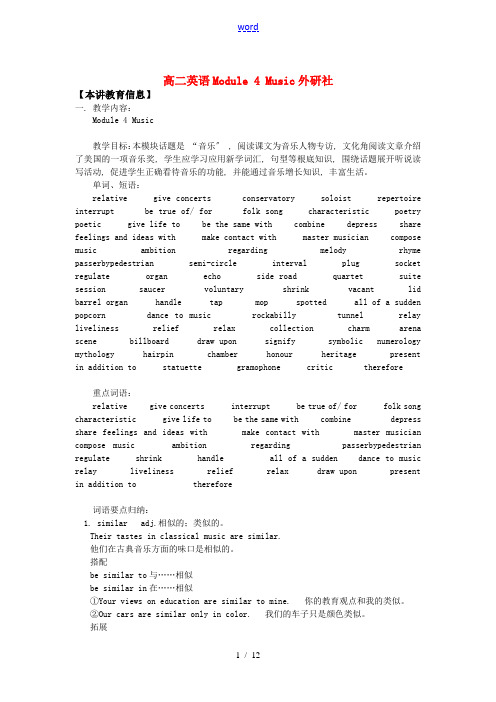
高二英语Module 4 Music外研社【本讲教育信息】一. 教学内容:Module 4 Music教学目标:本模块话题是“音乐〞 , 阅读课文为音乐人物专访, 文化角阅读文章介绍了美国的一项音乐奖, 学生应学习应用新学词汇, 句型等根底知识, 围绕话题展开听说读写活动, 促进学生正确看待音乐的功能, 并能通过音乐增长知识, 丰富生活。
单词、短语:relative give concerts conservatory soloist repertoire interrupt be true of/ for folk song characteristic poetry poetic give life to be the same with combine depress share feelings and ideas with make contact with master musician composemusic ambition regarding melody rhyme passerbypedestrian semi-circle interval plug socket regulate organ echo side road quartet suite session saucer voluntary shrink vacant lid barrel organ handle tap mop spotted all of a sudden popcorn dance to music rockabilly tunnel relay liveliness relief relax collection charm arena scene billboard draw upon signify symbolic numerology mythology hairpin chamber honour heritage present in addition to statuette gramophone critic therefore重点词语:relative give concerts interrupt be true of/ for folk song characteristic give life to be the same with combine depress share feelings and ideas with make contact with master musician compose music ambition regarding passerbypedestrian regulate shrink handle all of a sudden dance to music relay liveliness relief relax draw upon present in addition to therefore词语要点归纳:1. similar adj.相似的;类似的。
2019_2020学年高中英语Module4MusicSectionⅣGrammar
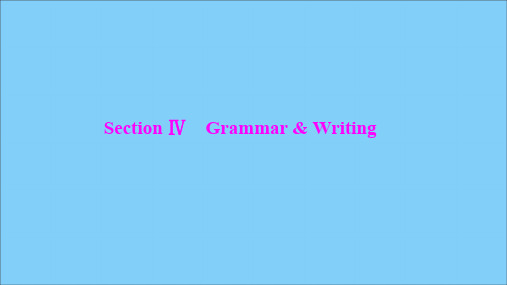
[即时演练2] 翻译句子 ①他一直在写信。
He has been writing a letter. ②他写了一封信。 He has written a letter. ③一直下了三天的雨了。 It has been raining for three days. ④已经下了三天的雨了。
It has rained for three days.
[知识归纳] (1)现在完成进行时的构成:助动词have/has+been+v.-ing形式。 (2)现在完成进行时的用法:①持续性用法,即表示动作或状态从过去某一时间 开始一直持续到说这件事时,动作或状态刚刚结束或还有可能继续下去。这种 时态常和all the time,this week,this month,all day,all the morning,these days,recently等时间状语连用,还常与since或for构成的时间状语连用。(例① -④) ②重复性用法,即表示一直到说话时为止的一段时间内一再重复的动作。(例⑥) ③表示感情色彩。
中国人已有2 000年的造纸历史。 ⑤Too much has been happening
today.
今天真是个多事的日子。
二、现在完成进行时和现在完成时的区别 [语境感悟] ①He has read a book.他读了一本书。(书已读完) ②He has been reading a book. 他一直在读一本书。(书尚未读完) ③Have you met her recently? 你最近见过她吗?(现实结果) ④Have you been meeting her recently? 你最近常和她见面吗?(动作反复)
[我的结论]
1. ①②③④⑥
句用了现在完成进行时; ⑤⑦ 句用了现在完成时。
关于音乐会的活动英语作文

关于音乐会的活动英语作文English Answer:The upcoming concert promises to be a spectacular showcase of musical talent and artistry. The lineup boasts a diverse array of renowned performers, each bringing their unique style and repertoire to the stage. The concert will feature a mesmerizing blend of classical, jazz, and contemporary music, catering to the diverse tastes of music enthusiasts.The concertgoers can expect an unforgettable evening filled with breathtaking performances. The venue's exceptional acoustics and state-of-the-art sound systemwill ensure that every note and nuance reaches the audience with crystal clarity. The stage will be adorned with elaborate lighting effects and projections, creating an immersive and visually captivating experience that will complement the musical performances.In addition to the main concert, attendees will have the opportunity to engage in various interactive activities and workshops. These activities will provide an immersive experience for music lovers, allowing them to learn about different musical styles, instruments, and techniques. There will also be opportunities to meet and interact with the performers, gaining insights into their creative process and inspiration.The concert is not only a celebration of musical excellence but also a platform for community engagement. The proceeds from the event will be donated to local music education programs, supporting young musicians andfostering a love of music in the community. By attending the concert, music lovers can not only enjoy a world-class musical experience but also make a meaningful contribution to the arts.中文回答:即将到来的音乐会将是一场音乐天赋和艺术的精彩展示。
高中英语 Module 4 Music Section Ⅳ Gram
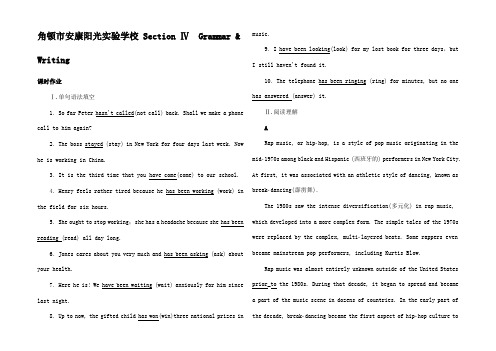
角顿市安康阳光实验学校 Section ⅣGrammar & Writing课时作业Ⅰ.单句语法填空1.So far Peter hasn't called(not call) back. Shall we make a phone call to him again?2.The boss stayed (stay) in New York for four days last week. Now he is working in China.3.It is the third time that you have come(come) to our school.4.Henry feels rather tired because he has been working (work) in the field for six hours.5.She ought to stop working;she has a headache because she has been reading (read) all day long.6.Jones cares about you very much and has been asking (ask) about your health.7.Here he is! We have been waiting (wait) anxiously for him since last night.8.Up to now, the gifted child has won(win)three national prizes in music.9.I have been looking(look) for my lost book for three days,but I still haven't found it.10.The telephone has been ringing (ring) for minutes, but no one has answered (answer) it.Ⅱ.阅读理解ARap music, or hiphop, is a style of pop music originating in the mid1970s among black and Hispanic (西班牙的) performers in New York City. At first, it was associated with an athletic style of dancing, known as breakdancing(霹雳舞).The 1980s saw the intense diversification(多元化) in rap music, which developed into a more complex form. The simple tales of the 1970s were replaced by the complex, multilayered beats. Some rappers even became mainstream pop performers, including Kurtis Blow.Rap music was almost entirely unknown outside of the United States prior_to the 1980s. During that decade, it began to spread and became a part of the music scene in dozens of countries. In the early part of the decade, breakdancing became the first aspect of hiphop culture toreach Germany, Japan and South Africa. Meanwhile, recorded rap music was released in France and the Philippines.In the 1990s and the following decade, elements of rap music continued to be absorbed into other kinds of popular music. In Europe, Africa, and Asia, rap music began to reach mainstream audiences.In the 2000s, the United States has seen the rise of alternative rap music in the form of popular performers like The Roots, Mos Def, and many others.In some countries, performers have become well known outside of their own countries, and rap music has continued to spread into new lands, including Russia, Egypt, and China.There are various views on rap music. For example, some people criticize rap music for the promotion of violence, while others admire it as a way to understand cultural idioms and consider many rappers to have an acute social and political awareness.【解题导语】本文是一篇说明文。
高中英语 Module 4 Music Sectio
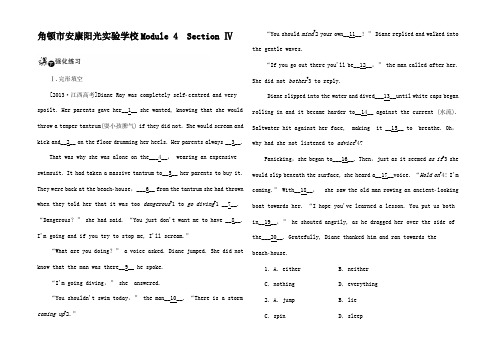
角顿市安康阳光实验学校Module 4 Section ⅣⅠ.完形填空[2013·江西高考]Diane Ray was completely selfcentred and very spoilt. Her parents gave her__1__ she wanted, knowing that she would throw a temper tantrum(耍小孩脾气) if they did not. She would scream and kick and__2__ on the floor drumming her heels. Her parents always __3__.That was why she was alone on the___4__, wearing an expensive swimsuit. It had taken a massive tantrum to__5__ her parents to buy it. They were back at the beachhouse,___6__ from the tantrum she had thrown when they told her that it was too dangerous W1 to go diving P1 __7__. “Dangerous?” she had said. “You just don't want me to have __8__. I'm going and if you try to stop me, I'll scream.”“What are you doing?” a voice asked. Diane jumped. She did not know that the man was there__9__ he spoke.“I'm going diving,” she answered.“You shouldn't swim today,” the man__10__. “There is a storm coming up P2.”“You should mind W2 your own__11__!” Diane replied and walked into the gentle waves.“If you go out ther e you'll be__12__,” the man called after her. She did not bother W3 to reply.Diane slipped into the water and dived___13__until white caps began rolling in and it became harder to__14__ against the current (水流). Saltwater hit against her face, making it __15__ to breathe. Oh,why had she not listened to advice W4?Panicking,she began to___16__. Then,just as it seemed as if P3 she would slip beneath the surface, she heard a__17__voice. “Hold on P4! I'm coming.” With__18__, she saw the old man rowing an ancientlooking boat towards her. “I hope you've learned a lesson. You put us bothin__19__,” he shouted angrily, as he dragged her over the side of the___20__. Gratefully, Diane thanked him and ran towards thebeachhouse.1. A. either B. neitherC. nothingD. everything2. A. jump B. lieC. spinD. sleep3. A. set out B. set inC. gave inD. gave out4. A. beach B. bedC. floorD. ship5. A. allow B. warnC. getD. prefer6. A. changing B. recoveringC. appearingD. traveling7. A. alone B. awayC. againD. aside8. A. time B. moneyC. foodD. fun9. A. when B. untilC. afterD. once10. A. decided B. intendedC. advisedD. repeated11. A. business B. swimsuitC. friendsD. parents12. A. angry B. sorryC. confusedD. excited13. A. nervously B. sadlyC. shylyD. happily14. A. rise B. swimC. stopD. row15. A. difficult B. easyC. comfortableD. suitable16. A. speak B. singC. sniffD. scream17. A. calm B. frighteningC. beautifulD. disgusting18. A. regret B. reliefC. interestD. ease19. A. power B. safetyC. dangerD. thought20. A. house B. waveC. beachD. boat本文为一篇记叙文,主要讲述了一个任性的女孩,喜欢一意孤行。
高中英语Module4MusicSectionⅤWriting__有关音乐活动的邀请信教案含解析外研版选修6
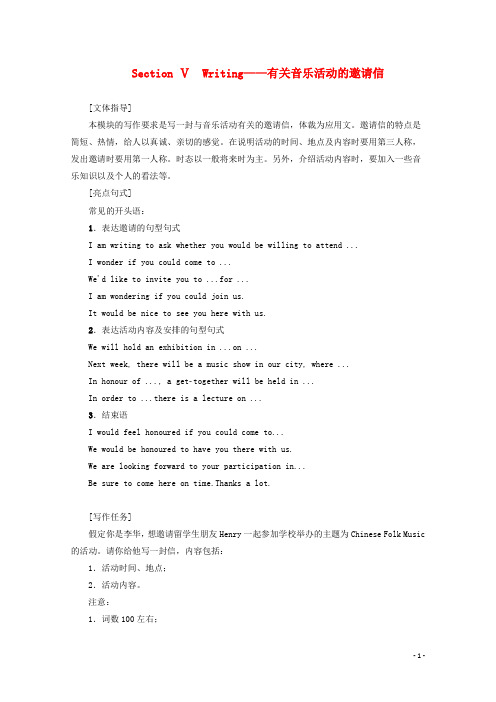
Section ⅤWriting——有关音乐活动的邀请信[文体指导]本模块的写作要求是写一封与音乐活动有关的邀请信,体裁为应用文。
邀请信的特点是简短、热情,给人以真诚、亲切的感觉。
在说明活动的时间、地点及内容时要用第三人称,发出邀请时要用第一人称。
时态以一般将来时为主。
另外,介绍活动内容时,要加入一些音乐知识以及个人的看法等。
[亮点句式]常见的开头语:1.表达邀请的句型句式I am writing to ask whether you would be willing to attend ...I wonder if you could come to ...We'd like to invite you to ...for ...I am wondering if you could join us.It would be nice to see you here with us.2.表达活动内容及安排的句型句式We will hold an exhibition in ...on ...Next week, there will be a music show in our city, where ...In honour of ..., a gettogether will be held in ...In order to ...there is a lecture on ...3.结束语I would feel honoured if you could come to...We would be honoured to have you there with us.We are looking forward to your participation in...Be sure to come here on time.Thanks a lot.[写作任务]假定你是李华,想邀请留学生朋友Henry一起参加学校举办的主题为Chinese Folk Music 的活动。
高中英语:Module 4《Music》教案3(9页)
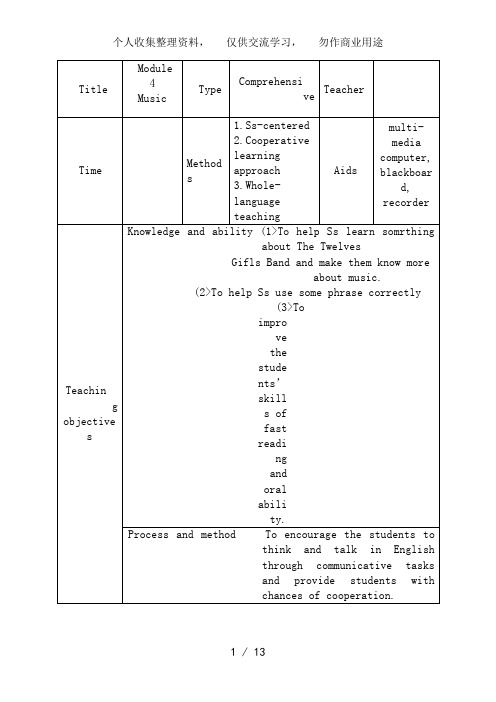
<一)重点单词:1. interpret动词 v. 口译;翻译say in one language what someone has said in another language iony9bE8XdI couldn’t speak Italian so I asked Maria to interpret for me in the shop. iony9bE8Xd我不会说意大利语,所以在商店里我请玛丽亚给我翻译。
Have you got to do any interpreting next week?下周你有什么口译任务吗?动词 v. 了解;抓到意思understand; take the meaning to beThey interpreted his silence as consent.他们把他的沉默理解为赞同。
2. combine动词 v. 使结合to<cause to)come together; unite; act togetherThe acid and alkali are combined into salt.酸与碱化合成盐。
We consider it necessary to combine theory with practice. iony9bE8Xd我们认为理论联系实际是必要的。
Combine each pair of sentences into one sentence, using the second as an attributive clause. iony9bE8Xd 把下列各对句子结合成一个句子,用第二句作为定语从句。
In proteins, atoms of nitrogen are combined with carbon, hydrogen and oxygen atoms. iony9bE8Xd在蛋自质中,氮原子与碳、氢、氧原子相化合。
2020学年高中英语Module4MusicSectionⅣUsingLanguage教案(含解析
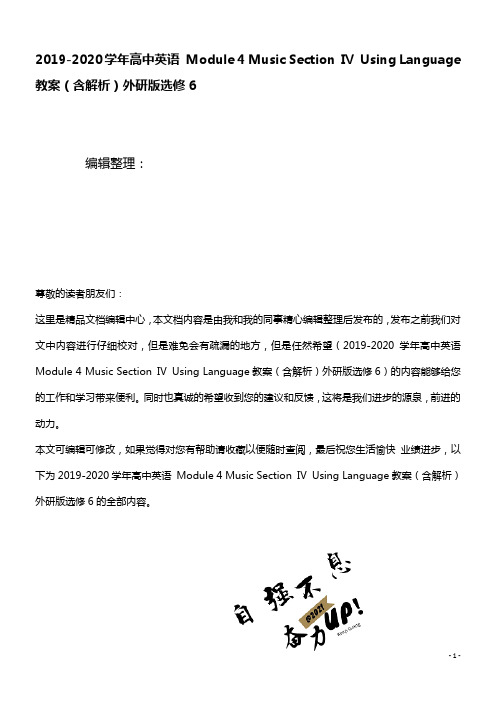
2019-2020学年高中英语Module 4 Music Section ⅣUsing Language 教案(含解析)外研版选修6编辑整理:尊敬的读者朋友们:这里是精品文档编辑中心,本文档内容是由我和我的同事精心编辑整理后发布的,发布之前我们对文中内容进行仔细校对,但是难免会有疏漏的地方,但是任然希望(2019-2020学年高中英语Module 4 Music Section ⅣUsing Language教案(含解析)外研版选修6)的内容能够给您的工作和学习带来便利。
同时也真诚的希望收到您的建议和反馈,这将是我们进步的源泉,前进的动力。
本文可编辑可修改,如果觉得对您有帮助请收藏以便随时查阅,最后祝您生活愉快业绩进步,以下为2019-2020学年高中英语Module 4 Music Section ⅣUsing Language教案(含解析)外研版选修6的全部内容。
Section ⅣUsing LanguagePart Ⅰ第一步速读—-了解文章主题和段落大意速读P49教材课文,匹配段落大意1.Para。
1 A.Other places where street music is performed.2.Para。
2 B.The scene of performing street music in Paris.3.Para.3 C.The reason why street music needsspace。
4.Para.4 D.The scene of performing street music in Barcelona。
[答案]1-4 DBAC第二步细读—-把控文章关键信息细读P49教材课文,选择最佳答案1.In the first paragraph, the reason why the crowd shrinks may be that .A.they have important things to doB.the performance of the musicians is poorC.they don’t want to give the musicians moneyD.they are forced to leave for not giving money to the musicians2.According to the second paragraph, we can infer that .A.the performer is keen on moneyB.below the window of the author’s apartment is the place where many musicians often performC.the musician doesn't like the life in ParisD.many people are familiar with him3.According to the passage, which of the following is NOT true?A.Street music can be seen in many places.B.Street music is less likely than the music made in a studio。
